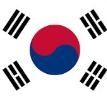South Koreans go to the polls on Tuesday in arguably its most critical elections since the advent of democracy in 1987. The elections follow a months-long political crisis that culminated in the impeachment and arrest of its former president, Park Geun-hye. Meanwhile, North Korea’s attempts to secure long range nuclear weapons have led to escalating tensions with the United States, giving the 9 May vote a wider geo-political significance.
Koreans are heading to the polls a year earlier than expected. In October 2016, after state prosecutors launched an investigation into Park’s relationship with her close friend and confidante, Choi Soon-sil, protestors took to the streets of Seoul and other cities, demanding the resignation of the president.
By December the corrupt nature of their association had become clear and nationwide protests swelled to an estimated two million people. Choi, and two of Park’s former aides, were subsequently indicted, implicating the president.
Responding to overwhelming public pressure, lawmakers passed an impeachment bill with 234 votes for and 56 votes against. On 10 March, Park’s fate was sealed when the eight-member Constitutional Court voted unanimously for her impeachment. Park was taken into custody soon thereafter and is currently awaiting trial.
Voter turnout is set to be high following intense public interest in the corruption saga. The National Election Commission has already counted 11.07 million votes (26.06% of possible voters) in a two-day early voting program. Increased participation among young voters is one of the main drivers of the high turnout.
The frontrunner, Moon Jae-in, of the left-leaning Democratic Party, is a human rights lawyer and former minister in the cabinet of popular ex-president, Roh Moo-hyun. Moon lost the previous election in 2012 to Park’s conservatives, but a Realmeter poll now puts him ahead with 45% of the vote.
In second place is Ahn Cheol-soo of the centrist People’s Party, with 11%. Ahn has enjoyed a late surge in popularity as he attracts many of the conservative voters who once supported Park, but it is unlikely that the former physician and business mogul will pose a significant challenge to Moon.
Hong Joon-pyo of Park’s conservative Liberty Korea Party is currently fourth in the polls at 6.9%, behind the far-left Justice Party at 8.6 percent. An erstwhile Park ally, Hong has struggled in the wake of the corruption scandal. A law and order conservative, Hong is hoping for votes from his home province of Gyeongsang-do.
The majority of the 15 presidential candidates have concentrated on domestic policy matters relating to the economy, social issues, education and welfare. As Asia’s fourth largest economy, there is growing concern over the role of South Korea’s large family-owned conglomerates, or Chaebol, following the recent arrest of the Samsung Group’s Jay Y. Lee on charges of bribery, perjury and embezzlement.
However, the growing brinkmanship between the United States and North Korea has also influenced the elections, particularly following the deployment in the South of a US missile defense system, the Terminal High Altitude Area Defense or “THAAD”.
Ahn and Hong have adopted hostile positions towards the North and are seeking to maintain close ties with America. Both back the THAAD programme and have supported Donald Trump’s strident response to North Korean dictator, Kim Jong-un’s, intercontinental ballistic missile tests.
However, Moon has taken a more taciturn approach to the United States. While continuing to support Korea’s traditional ally, he has also stressed the need to cultivate closer ties with China (Korea’s most important trade partner, accounting for 26% of Korean exports and 21% of its imports). But THAAD has put a strain on Seoul’s relations with Beijing: Korean businesses operating in China have suffered from consumer boycotts, while Chinese tourism volumes to Korea have also declined.
Moon’s pragmatic approach to the North has been likened to the so-called “Sunshine Policy” followed by former presidents, Kim Dae-jung and Roh moo-hyun in the 2000s. The Sunshine Policy aimed to open dialogue between the two countries by providing financial aid in exchange for demilitarization.
However, the Sunshine Policy was unable to bring about regime change in North Korea nor halt its acquisition of nuclear weapons. Detractors criticized it as an appeasement strategy, and the policy was eventually abandoned by conservative President Lee Myung-bak in 2008.
Notwithstanding the past failures of the Sunshine Policy, Moon may favour a return to rapprochement with the North, while maintaining existing sanctions on the Kim Jong-un regime and pushing for market reforms. Although THAAD will prove to be an obstacle, Moon may be able to leverage improved ties with Beijing to put pressure on Pyongyang indirectly.
Christopher Ansara is an English teacher based in Yeongcheon, South Korea. David Ansara is an independent policy analyst and consultant in Johannesburg.

